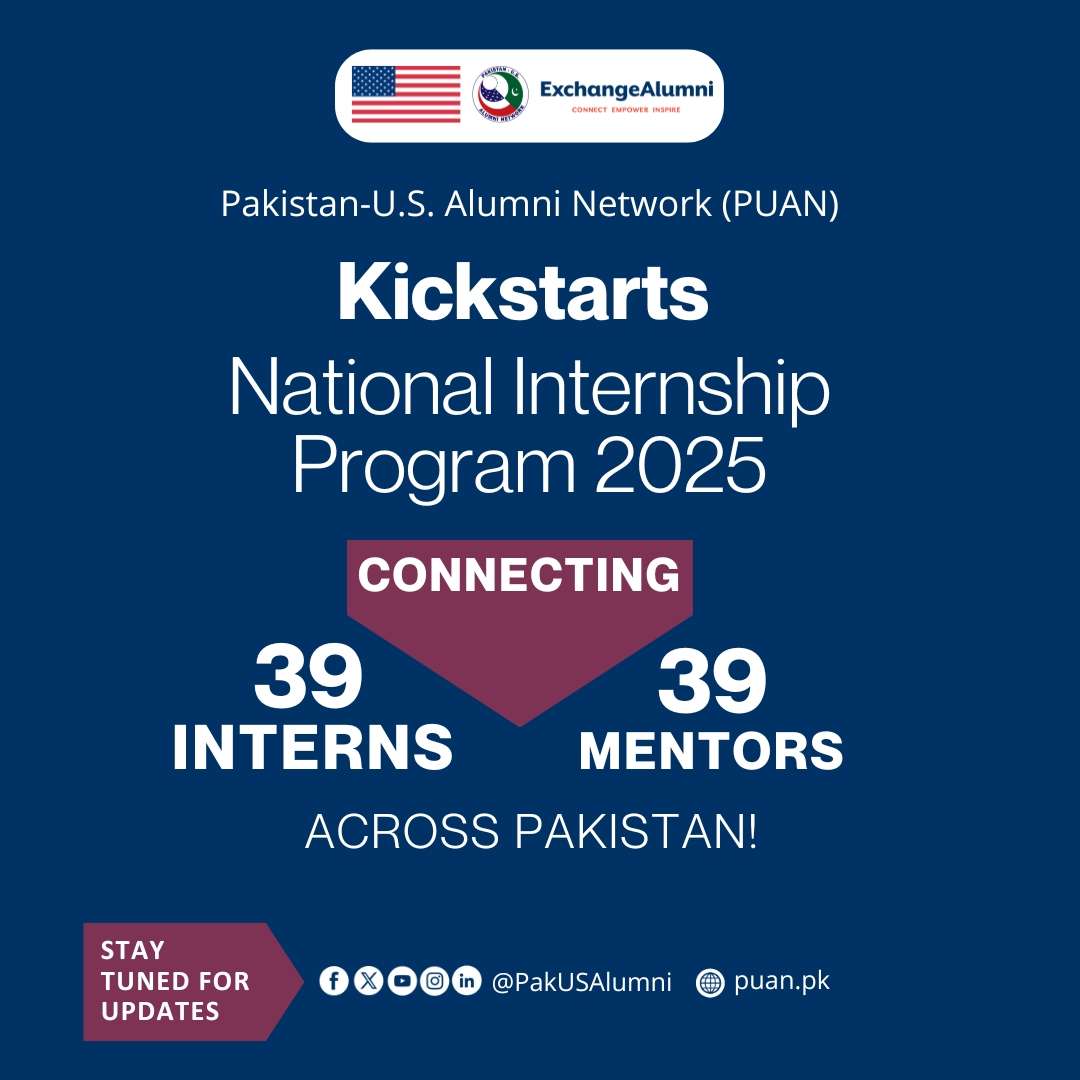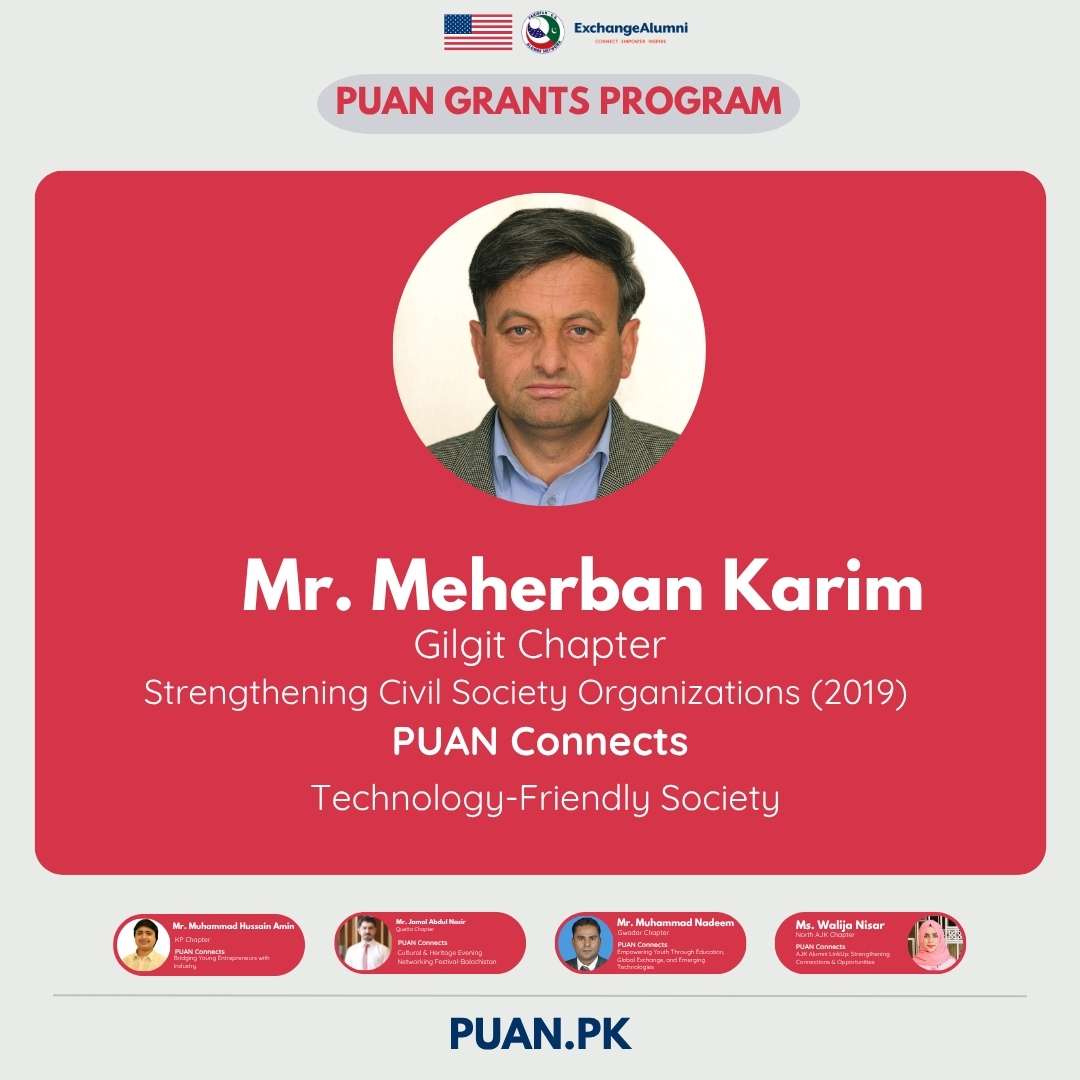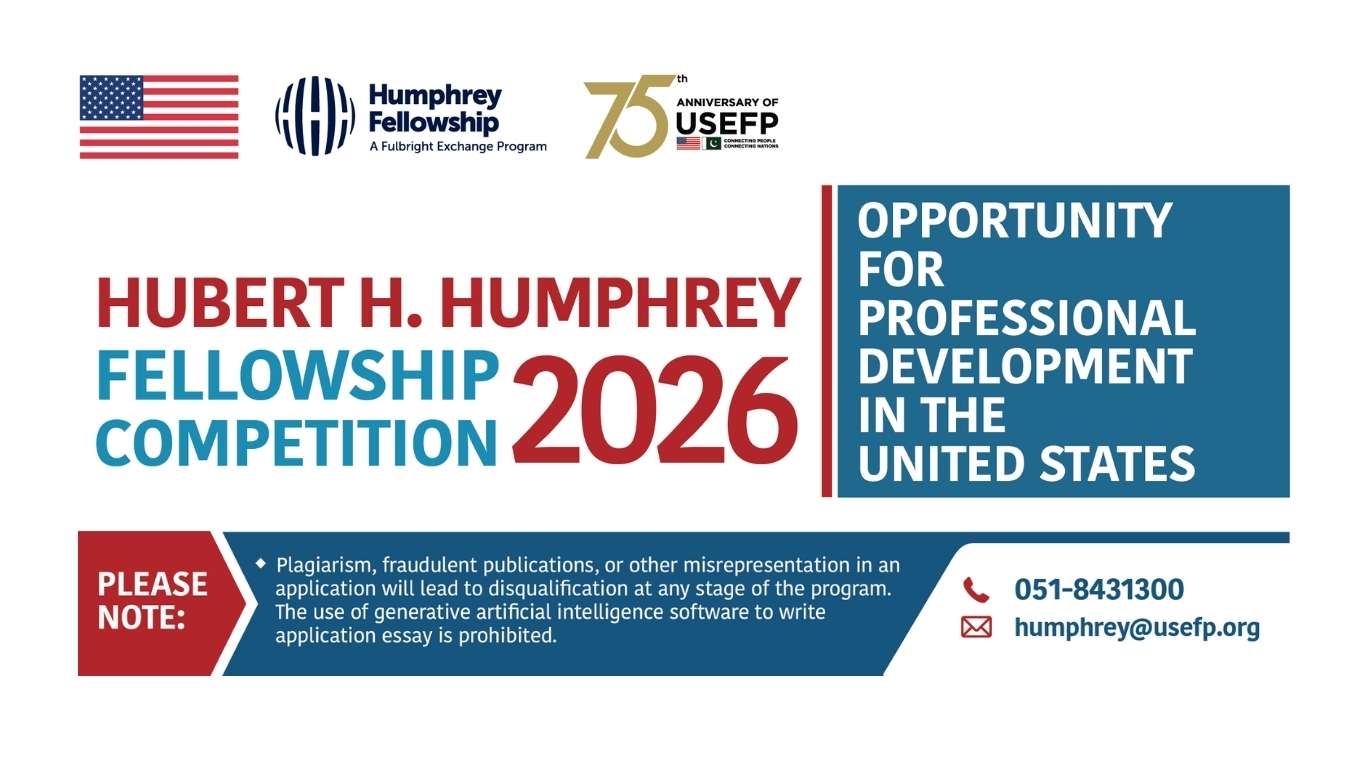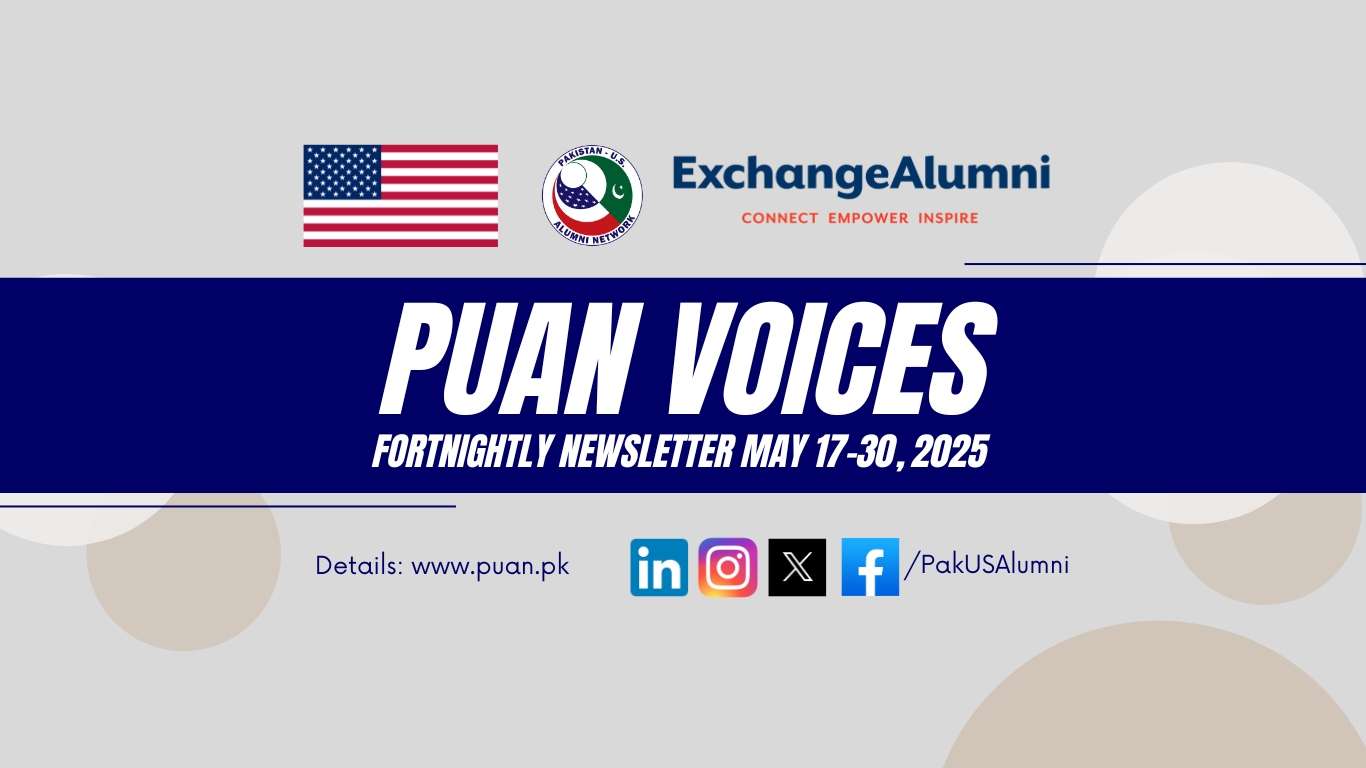By Hira Nafees Shah
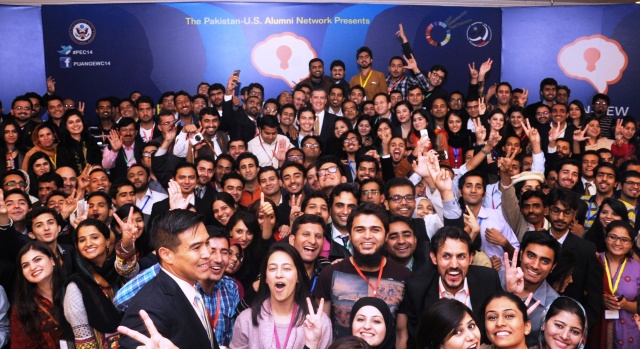
International Visitor Leadership Program (IVLP) alumna Mehreen Rashid was confused. Having worked for ten years as a broadcast journalist, she had decided to jump into entrepreneurship when she felt that her profession was not providing her the satisfaction that she needed. She set up her media company but kept running into bottlenecks,unsure about how to proceed next.
Help arrived in a timely fashion, when Rashid registered to take part in an Entrepreneurship Conference organized by the Pakistan-U.S Alumni Network from November 21st to 23rd in Islamabad.
The event was the largest U.S. alumni event organized for Global Entrepreneurship Week in the world, bringing together more than 300 alumni of 24 different U.S. sponsored exchange programs under one roof. IVLP Alumnus Kashif Khan, who is also the President of GEW-Pakistan, was the main alumni organizer for the affair.
Economic empowerment ultimately depends on entrepreneurs – people like you – who are willing to take that first risky step and invest their time, talent, and resources in an idea that they believe in,” said U.S Ambassador Richard Olson, the chief guest at the occasion. “Just as a secure and stable Pakistan is vital to the American national interest, an economically vibrant Pakistan will contribute to the prosperity of this region of the world.”

Motivating breakout workshops, thought-provoking videos, and a competitive pitching session, formed the core of the three day event. The highlight of the first day of the conference was a keynote session moderated by Sidra Iqbal, which was attended by Planning and Development Minister Ahsan Iqbal, P@SHA President Jehan Ara, Afghan Fulbrighter Masoud Juya, Nabeel Qader of the Punjab Information Technology Board, and Amin Hashwani, Director of the Hashwani Group and President of the Pakistani-India CEOs Business Forum.
“The government has started a number of youth-related loans so that the youth can become job-creators and not job-seekers,” said Iqbal, while highlighting the government’s efforts to promote entrepreneurship during his session.
Breakout Sessions Impress Participants
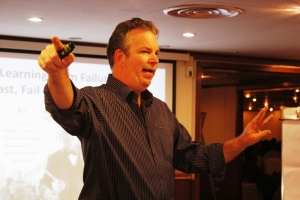
Day Two of the conference kicked-off a series of breakout sessions tailored to the needs of specific business sectors. “Muneeb Maayr’s session was the best because the advice that he gave was very good that everybody should develop financial skills and market themselves properly,” said Umul Awan, a Fulbright alumnus.
“I really liked Sean Griffin’s session because he gave us invaluable statistics on starting a business. For example, he told us that on average it takes 18 to 30 months to earn 15 hundred rupees from a startup,” said Mutawakkil Abbasi, a UGrad alumnus. Besides Maayr and Griffin, nearly 40 speakers attended the event, including Farrukh Malik of discretelogix.com, Azhar Zaheer of Picycle, Saad Hamid of Invest2Innovate, and Qazi Fazli Azeem, who reflected on their personal journeys building startups and provided practical industry advice to aspiring entrepreneurs.
“Starting a business is easy, building one is very hard! Persistence is key and consistency is very important,” said Sean Griffin, the StartUp Cup Founder.
Many alumni praised the panel session on Entrepreneurial Success Stories, which included local heroes like Master Ayub, Yasmeen Lari, Qurban Bibi, and Rafi Imran Amjad, among others. Master Ayub received a standing ovation when he narrated the story of how he set up his school and it grew from having one student to a huge network of pupils in the span of 28 years.
Lari, Pakistan’s first female architect gave a presentation on Combating Poverty for Disaster Preparedness.Pak Wheels CEO Muhammad Raza Saeed advised the entrepreneurs not to lose focus and remain dedicated to their ventures.
“The Entrepreneurship conference is really good because I am getting an opportunity to meet great people,” said Iqra Sadia, UGrad alumnus. “I have also learned how to flourish my idea and gained a lot of mentorship.” She added that she gained the most from a session led by Zafar Khan, CEO of Sofizar, who spoke on building one’s own startup.
Zafar Khan’s session was part of a second round of breakout workshops. Other workshops included by Raheel Waqar of White Rice Communications, Saad Amanullah Khan, former president of the American Business Council and a highly interactive session by Musstanser Tinauli of Foori Mazdoori, in which participants were divided into groups and pitched ideas.
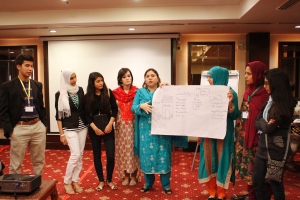
One of the highlights of the event was the diversity of participants, and the unique opportunities for networking as part of it. As the conference progressed,the alumni received ample opportunities to network with each other and to flesh out their business and social enterprise ideas.
“I want to create a news syndicate for Quetta so that I can improve the image of the city,” said Farwa Kawal, SUSI Alumna. “The sessions in the conference were inspiring enough to spark my interest in becoming dedicated to my idea.”
Osama Khawaja, a Fulbright alumnus, remarked that “the conference is an excellent experience because people are here from the northern areas of Pakistan and have also received an opportunity to participate.”
Established professionals also benefitted from the reunion. Umar Adnan, a Fulbrighter who launched a startup E4 Tech at NUST, said he found the conference extremely useful.
“The first thing that I will do after this conference is to include three mentors on the board of advisers in my startup,” he said. “I also received a lot of clarity in many other business issues by attending this event.”
Alums Learn about Social Entrepreneurship
The conference also explored the role of social responsibility in business development, and financial sustainability in social enterprise. In this vein, an outstanding panel discussion was held with Zeba Hussain, of the Mashal Model School, Humaira Bachal, President of the Dream Foundation Trust, Faraz Khan, CEO and Co-Founder of SEED Ventures, Ayesha Batool of Main Muhammad Bukhsh Trust, and Slama Jafri, of Worldpol.net.
“I started my school when I was 12 years old and now 1200 families are registered with us,” said Bachal, while outlining her struggle for education.
The final series of workshops taught the attendees how to scale their enterprises after launching their businesses. Famous musician Haroon Rashid talked about his newest venture, Taazi.com, which provides legal music downloads that support a decent living for musicians in Pakistan.
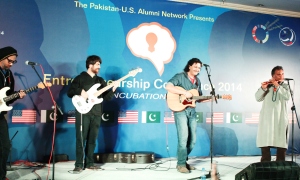
Meanwhile, IVLP Alumna Shamama Arbab, Director of Euro Industries Peshawar, encouraged her audience to take action and gave them tips for survival over the long run. “Stay aligned with your inner self and always have a contingency planning for any business that you have,” she said.
In this phase of the conference, Sean Griffin of StartUp Cup invited his audience members to develop their business plans. “Sean gave me a monthly and a weekly target which cleared my perspective,” said one participant, Mehreen Rashid. “This conference has done away with the fog in my mind as far as my business is concerned, so now I need to do a lot of homework.”
Ideas into Action
All of the lessons of the conference came together on the third day, when alumni and local university students pitched their business ideas in front of investors. The pitches introduced Pakistani ideas and products to address needs in the Pakistan and South Asian markets, including everything from improved solar panel production and biogas generation systems to monitors for water filtration systems, to medical devices for the treatment of kidney stones. Event speakers and investors carefully judged the events and took real interest in the potential projects.
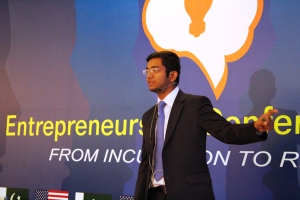
But perhaps the greatest take away from the whole episode was the realization that entrepreneurship not only improves economic conditions in Pakistan, but also has the potential to pave way for better relations between Pakistan, the United States, and its neighbors.
“Entrepreneurship is a very good alternative to bring nations together, as business is not affected by ethnicities, backgrounds and nationalities,” said Masoud Juya, a conference participant and founder of Kahkashan-e-Sharq University in Afghanistan.
To take a look at the photographs from the event, check out this Flickr link:
https://www.flickr.com/photos/pakusalumni/sets/72157649053098498/
To find out more, visit:
https://www.facebook.com/PUANGEWC14


